“Let food be thy medicine and medicine be thy food.” – Hippocrates
Welcome to my article on the topic of whether bearded dragons can eat strawberries. If you’re a bearded dragon owner or considering getting one, you might be curious about the dietary options for your scaly friend. One fruit that often comes to mind is strawberries. These juicy and delicious berries are a popular snack for humans, but what about our reptilian companions?
In this article, I will explore the question of whether bearded dragons can safely consume strawberries. I will discuss the nutritional value of strawberries, how often they can be included in a bearded dragon’s diet, and the potential risks associated with feeding strawberries to these reptiles. So, let’s dive in and discover if strawberries are a suitable treat for your bearded dragon!
Key Takeaways:
- Bearded dragons can eat strawberries in moderation as a treat.
- Strawberries should not replace other essential components of a bearded dragon’s diet.
- Feeding strawberries too often can lead to a higher phosphorus to calcium ratio and metabolic bone disease.
- It is important to offer a varied and balanced diet that meets the nutritional needs of bearded dragons.
- Other safe fruit options for bearded dragons include blueberries, raspberries, blackberries, and mangoes.
How Often Can Bearded Dragons Have Strawberries?
Bearded dragons can have strawberries as a treat once a week or less frequently. The nutritional value of strawberries makes them a suitable addition to a bearded dragon’s diet, but they should not be consumed too frequently. Feeding strawberries too often can lead to a higher phosphorus to calcium ratio, which can result in metabolic bone disease. It is important to find a balance and offer a variety of fruits and vegetables in a bearded dragon’s diet.
While strawberries are a tasty treat for our scaly friends, moderation is key to maintain their overall health and well-being. Strawberries are packed with essential vitamins and minerals, including vitamin C, fiber, and antioxidants, which can contribute to a bearded dragon’s overall nutrition. However, it’s essential to avoid excessive consumption of strawberries due to their higher phosphorus content.
Feeding a bearded dragon strawberries once a week or less helps to ensure that their calcium to phosphorus ratio remains balanced. This balance is crucial for their bone health and prevents the development of metabolic bone disease, a condition characterized by weakened bones and poor overall health.
It’s important to note that strawberries should not be the sole component of a bearded dragon’s diet. They should be offered in conjunction with a well-rounded and varied menu of other fruits, vegetables, and live insects to meet their nutritional requirements.
Introducing a variety of foods not only prevents nutritional imbalances but also encourages the natural foraging behavior of bearded dragons, keeping them mentally stimulated and satisfied.
Why Can’t Bearded Dragons Eat Strawberries All the Time?
Although strawberries offer several nutritional benefits, they should not be consumed regularly by bearded dragons. Strawberries have a higher phosphorus content compared to calcium, which can interfere with calcium absorption and lead to metabolic bone disease. Additionally, strawberries have a high water content, and too many can cause diarrhea and dehydration in bearded dragons. They also contain a significant amount of sugar, which can contribute to tooth decay, obesity, and other health issues if consumed in excess.
While strawberries can be a delicious treat for your bearded dragon, it is essential to ensure that their diet consists of a variety of foods that meet their nutritional needs. Let’s explore some of the best foods for bearded dragons that you can incorporate into their diet to provide them with the essential nutrients they require.
Best Foods for Bearded Dragons
- Leafy Greens: Offer a variety of leafy greens such as collard greens, mustard greens, dandelion greens, and kale. These greens are rich in vitamins and minerals that are vital for your bearded dragon’s overall health.
- Vegetables: Include a diverse range of vegetables like bell peppers, carrots, zucchini, and squash. These vegetables provide additional nutrients and add variety to your bearded dragon’s diet.
- Insects: Feed your bearded dragon a selection of live insects like crickets, mealworms, and dubia roaches. Insects are an important source of protein and should be a staple in their diet, especially for younger dragons.
- Fruits: Offer occasional fruits like blueberries, raspberries, and mangoes as treats. These fruits provide natural sugars and additional vitamins.
By incorporating a balanced diet that includes these best foods for bearded dragons, you can ensure that your pet receives the necessary nutrients for growth, development, and overall well-being.
Remember, while strawberries can be an occasional treat, it is essential to provide a diverse and nutritionally balanced diet for your bearded dragon. This will help promote their health and prevent any potential health issues that may arise from an unbalanced or excessive intake of certain foods.
How Can Bearded Dragons Eat Strawberries?
Bearded dragons can enjoy strawberries in different ways. They can take small bites out of a whole strawberry or have them chopped into small pieces and mixed with other food in their dish. The texture and flavor of strawberries make them a tempting treat for bearded dragons.
When offering strawberries to your bearded dragon, it’s important to wash them thoroughly, especially if they are not organic. This ensures that any chemical residues from pesticides are removed, keeping your pet safe.
Here is a step-by-step guide on how to feed strawberries to your bearded dragon:
- Wash the strawberries with water to remove any dirt or debris.
- Remove the green stem and leaves from the top of the strawberry.
- Depending on your bearded dragon’s size, you can either offer a small whole strawberry or chop it into smaller pieces.
- Place the strawberries in your bearded dragon’s dish, either as a standalone treat or mixed with other vegetables or fruits.
- Monitor your bearded dragon while they eat the strawberries to ensure they are biting and chewing the food properly.
Remember to offer strawberries in moderation to maintain a balanced diet for your bearded dragon. While they can enjoy the occasional strawberry, it should not replace other essential components of their diet.
Bearded Dragon Diet Guide:
| Diet Component | Percentage |
|---|---|
| Insects (crickets, mealworms, etc.) | 70% |
| Leafy greens (collard greens, mustard greens, etc.) | 20% |
| Vegetables and fruits (including strawberries) | 10% |
Feeding a variety of insects, leafy greens, and other vegetables alongside strawberries will ensure that your bearded dragon receives a well-rounded and nutritious diet.
Providing a diverse diet is essential for the health and well-being of your bearded dragon. It’s always best to consult with a reptile veterinarian or herpetologist to ensure you are meeting your pet’s specific dietary needs.
Can Baby Bearded Dragons Eat Strawberries?
When it comes to the diet of baby bearded dragons, it is important to provide them with the right balance of nutrients for their growth and development. While baby bearded dragons can eat strawberries, it is not recommended to include them in their diet regularly.
Baby bearded dragons have different nutritional requirements compared to their adult counterparts. Their diet should primarily consist of insect-based and live foods, which are essential for their proper development. These foods provide the necessary proteins and nutrients that baby bearded dragons need to thrive.
However, introducing small pieces of strawberry as an occasional treat is acceptable. It can add some variety to their diet and be a pleasant sensory experience for them.
“While it is not recommended to include strawberries in the regular diet of baby bearded dragons, offering them as an occasional treat can be a delightful experience.”
– Reptile Nutritionist
Just like with any new food, it is important to monitor your baby bearded dragon’s response to strawberries. Some individuals may have sensitivity or allergic reactions, so it’s crucial to observe their behavior and digestive health after introducing this fruit.
To provide a comprehensive understanding of the nutritional needs of baby bearded dragons, it is important to focus primarily on insect-based and live foods. These foods ensure that they receive the necessary nutrients for their growth, such as high-quality proteins and essential vitamins.
While strawberries can be a delightful treat, they should not replace the main intake of insect-based and live foods. Ensuring a diverse and balanced diet will help promote the healthy growth of baby bearded dragons.
Alternative Foods for Baby Bearded Dragons
In addition to their main diet of insect-based and live foods, there are other suitable options to provide a varied and nutritious diet for baby bearded dragons. These foods can supplement their nutrient intake and add different flavors to their meals. Some safe options include:
- Small pieces of apples
- Mango chunks
- Papaya pieces
- Blueberries
Remember to introduce these fruits gradually and monitor your baby bearded dragon’s response. Each individual may have unique preferences and tolerances, so it’s important to cater to their specific needs.
Ultimately, the aim is to provide a diet that meets the nutritional requirements of baby bearded dragons and supports their healthy growth. While strawberries can be a fun occasional treat, their main nutritional intake should be based on insect-based and live foods.
From What Age Can Bearded Dragons Eat Strawberries?
As bearded dragons grow and develop, their dietary needs change. At around a year old, bearded dragons have transitioned from their primarily carnivorous diet to one that incorporates more plant-based foods. This is the age when they can start eating strawberries as part of their diet.
However, it is important to introduce strawberries gradually and in moderation. While strawberries offer some nutritional benefits, they should not replace other essential components of a bearded dragon’s diet. Younger bearded dragons should primarily focus on insect-based foods to meet their growth and nutritional needs.
Can Bearded Dragons Eat Strawberry Leaves?
Bearded dragons can indeed eat strawberry leaves, and they may even be a healthier option for them than the fruit itself. While strawberries are considered safe for bearded dragons when fed in moderation, the leaves can provide additional nutritional benefits. However, it is important to avoid overfeeding strawberry leaves and maintain a balanced diet for your pet reptile.
Greens like mustard and lettuce varieties are generally a healthier option for bearded dragons as they offer a wider range of nutrients. These greens can provide the necessary vitamins and minerals that contribute to the overall health and well-being of your bearded dragon.
Remember that moderation is key when it comes to feeding any food, including strawberry leaves, to your pet. Offering a diverse and balanced diet that includes a variety of vegetables and leafy greens is crucial for the overall nutritional needs of your bearded dragon.
The Benefits of Strawberry Leaves
Strawberry leaves contain important nutrients that can support your bearded dragon’s health. These benefits include:
- High fiber content: Strawberry leaves are a good source of dietary fiber, which aids in digestion and keeps your bearded dragon’s gut healthy.
- Essential vitamins and minerals: Strawberry leaves contain vitamins A and C, as well as calcium, potassium, and iron, which are all essential for maintaining proper bodily functions.
- Hydration: Like the fruit itself, strawberry leaves also have a high water content, which can help keep your bearded dragon hydrated.
While strawberry leaves can offer these benefits, it is important to feed them in moderation and alongside other nutritious greens to ensure a well-rounded diet for your bearded dragon.
Can Bearded Dragons Eat Strawberry Seeds?
Bearded dragons can safely eat strawberry seeds. Their strong jaws are perfectly capable of handling the soft seeds without any issues. However, it is crucial to feed strawberries to bearded dragons in moderation to avoid excessive seed intake.
Feeding too many strawberry seeds can lead to digestive issues and potentially cause a gut blockage. Therefore, it is important to provide a balanced diet for your bearded dragon and ensure that strawberries, including the seeds, are only given in appropriate quantities.
The Importance of Moderation
While strawberry seeds are generally safe for bearded dragons, it is essential to remember that they should not be the primary component of their diet. Bearded dragons have specific nutritional needs, and a variety of foods are necessary to meet those requirements.
Feeding bearded dragons a diverse range of fruits, vegetables, and insects ensures that they receive the necessary vitamins, minerals, and protein for their overall health. Incorporating strawberries as an occasional treat can provide some variety and enjoyment for your pet.
Avoiding Excessive Seed Intake
To prevent overconsumption of strawberry seeds, it is recommended to offer bearded dragons sliced or mashed strawberries instead of whole fruits. This way, you can easily control the amount of seeds they ingest.
Remember, while strawberry seeds themselves are harmless, feeding too many strawberries or any other food item can disrupt the balance of nutrients in a bearded dragon’s diet. Strive for a well-rounded feeding routine that includes a mix of vegetables, fruits, and insects to promote optimal health for your beloved reptile.
| Nutrient | Amount |
|---|---|
| Fiber | 2g |
| Protein | 1g |
| Calcium | 20mg |
| Phosphorus | 20mg |
| Vitamin C | 35mg |
Alternative Fruits That You Can Feed Bearded Dragons
While strawberries are considered safe for bearded dragons when fed in moderation, there are other fruits that can also be included in their diet. It’s important to provide a varied and balanced diet to meet their specific nutritional needs.
Here are some safe fruits that you can feed your bearded dragon:
- Blueberries: These small, antioxidant-rich fruits are packed with vitamins and minerals that support a healthy immune system.
- Raspberries: These delicious berries provide fiber and essential nutrients, including vitamin C and manganese.
- Blackberries: Rich in antioxidants and fiber, blackberries can be a tasty and healthy addition to your bearded dragon’s diet.
- Mangoes: A tropical fruit that is high in vitamin C and vitamin A, mangoes can help support your bearded dragon’s overall health.
When feeding fruits to your bearded dragon, remember to offer them in moderation and consider their nutritional content. Fruits should be a complement to a primarily vegetable and insect-based diet. Always wash fruits thoroughly before feeding them to your pet.
By providing a variety of safe fruits, you can ensure that your bearded dragon receives a balanced and nutritious diet.
| Fruit | Nutritional Benefits |
|---|---|
| Blueberries | Antioxidants, vitamins, and minerals |
| Raspberries | Fiber, vitamin C, and manganese |
| Blackberries | Antioxidants and fiber |
| Mangoes | Vitamin C, vitamin A, and antioxidants |
The Natural Diet of Bearded Dragons
In the wild, bearded dragons have a diverse diet that includes beetles, rodents, smaller lizards, and the leaves, flowers, and fruits of suitable plants. Their natural habitat provides them with a wide variety of foods to meet their nutritional needs. However, when kept as pets, it is essential to ensure their diet is well-balanced and meets their specific requirements.
Providing a proper diet is crucial for the overall health and well-being of bearded dragons. A balanced diet should consist of a combination of insects, greens, and vegetables. This variety ensures that bearded dragons receive the necessary nutrients and vitamins they need to thrive.
Here’s a breakdown of the key components of a bearded dragon’s diet:
Insects
- Cricket
- Dubia Roach
- Phoenix Worm
- Mealworm
- Superworm
- Waxworm
Feeding your bearded dragon a variety of insects helps meet their protein requirements. Gut-loading the insects with nutritious greens or commercial insect feed before feeding them to your pet ensures they receive essential vitamins and minerals. However, be mindful not to overfeed insects, as they should make up only a portion of their overall diet.
Greens and Vegetables
- Collard Greens
- Mustard Greens
- Dandelion Greens
- Kale
- Endive
- Bok Choy
Leafy greens and vegetables are vital for providing bearded dragons with fiber, vitamins, and minerals. These should make up the majority of their diet. It’s important to offer a variety of greens to ensure a well-rounded nutritional intake. Remember to thoroughly wash all greens and vegetables to remove any pesticide residues.
Fruits
- Papaya
- Blueberries
- Raspberries
- Mango
- Watermelon
Fruits should be offered sparingly as treats, as they are higher in sugar. They provide additional nutrients and can entice bearded dragons to eat their greens. It’s important to limit the amount of fruit given to prevent obesity and other health issues.
Remember to always provide fresh, clean water for your bearded dragon, as proper hydration is crucial for their overall health.
Providing a well-rounded and balanced diet that mimics their natural food sources is essential for the overall health and happiness of bearded dragons. By understanding their natural diet and meeting their specific nutritional requirements, you can ensure that your pet thrives in a captive environment.
Nutritional Requirements of Bearded Dragons
Meeting the nutritional needs of bearded dragons is crucial to ensure their overall health and prevent conditions like metabolic bone disease. Their diet should primarily consist of leaves and flowers, with a smaller percentage of fruits. Calcium is an essential component of a bearded dragon’s diet and plays a crucial role in their bone health.
Calcium to phosphorus ratio: It is important to maintain a proper calcium to phosphorus ratio in their diet. Bearded dragons require more calcium than phosphorus to support healthy bone growth and development. A balanced ratio is essential to prevent nutritional imbalances and related health issues.
| Nutrient | Calcium | Phosphorus |
|---|---|---|
| Recommended Ratio | 2:1 | 1:1 |
| Bearded Dragon Diet | Variety of calcium-rich greens, calcium supplements | Leafy greens, vegetables, fruits |
Aging and dietary changes: As bearded dragons age, their diet should gradually shift towards a higher percentage of plant matter. Younger bearded dragons have higher protein requirements and should primarily rely on insect-based foods for growth. However, as they mature, the emphasis should be placed on leafy greens, vegetables, and a smaller portion of fruits to meet their nutritional needs.
Additional considerations: Along with a balanced diet, providing access to natural light and proper hydration is essential for bearded dragons’ overall well-being. UVB exposure allows the synthesis of vitamin D3, which aids in calcium absorption, while access to clean water or regular misting helps prevent dehydration.
By understanding and meeting the nutritional requirements of bearded dragons, you can ensure that they lead happy and healthy lives. Consult with a reptile veterinarian or herpetologist for guidance on specific dietary needs and supplementation for your beloved pet.
Conclusion
In conclusion, when it comes to the bearded dragon diet, strawberries can be a tasty addition but should be offered in moderation. While they offer some nutritional benefits, they should not replace the essential components of a bearded dragon’s diet. It is crucial to provide a balanced and varied diet that meets their specific nutritional needs. Feeding strawberries as an occasional treat can be enjoyable for your reptile friend, but it should not be the primary source of nutrition.
Remember, a well-rounded bearded dragon diet consists of a combination of proteins from insects, leafy greens, and vegetables. These provide the necessary nutrients to support their growth and overall health. While strawberries can be juicy and tempting, it’s important to offer them alongside other nutritious foods.
So, whether you’re feeding your bearded dragon fruits, vegetables, or insects, always ensure you have a good understanding of their dietary requirements. Keeping a balanced diet and offering a variety of foods will help keep your bearded dragon healthy and happy in the long run!
FAQ
Can bearded dragons eat strawberries?
Yes, bearded dragons can eat strawberries, but they should be limited in their diet and fed as a treat once a week or less frequently.
How often can bearded dragons have strawberries?
Bearded dragons can have strawberries as a treat once a week or less frequently, depending on the other fruits in their diet.
Why can’t bearded dragons eat strawberries all the time?
Feeding strawberries too often can lead to a rejection of vegetables and other necessary nutrients, as well as a higher phosphorus to calcium ratio, which can result in metabolic bone disease.
How can bearded dragons eat strawberries?
Bearded dragons can take small bites out of a whole strawberry or the strawberries can be chopped into small pieces and mixed with other food in their dish.
Can baby bearded dragons eat strawberries?
While baby bearded dragons can eat strawberries, it is not recommended to include them in their diet regularly. Their main intake should be focused on foods that provide essential nutrients for growth and development.
From what age can bearded dragons eat strawberries?
Bearded dragons can start eating strawberries when they reach about a year old. However, younger bearded dragons should focus more on insect-based foods for their growth and nutritional needs.
Can bearded dragons eat strawberry leaves?
Bearded dragons can eat strawberry leaves, but they should not overdo the amount. Greens like mustard and lettuce varieties are generally a healthier option for them.
Can bearded dragons eat strawberry seeds?
Bearded dragons can eat strawberry seeds without any problems, but it is important to feed strawberries in moderation to prevent excessive seed intake.
What are some alternative fruits that you can feed bearded dragons?
Safe fruits that bearded dragons can eat include blueberries, raspberries, blackberries, and mangoes, among others. It is important to consider the nutritional content and offer them as part of a balanced diet.
What is the natural diet of bearded dragons?
In the wild, bearded dragons have a varied diet that includes beetles, rodents, smaller lizards, and the leaves, flowers, and fruits of suitable plants. In captivity, their diet should consist of a combination of insects, greens, and vegetables.
What are the nutritional requirements of bearded dragons?
Bearded dragons have specific nutritional requirements that should be met to prevent conditions like metabolic bone disease. Their diet should consist mainly of leaves and flowers, with a smaller percentage of fruits.



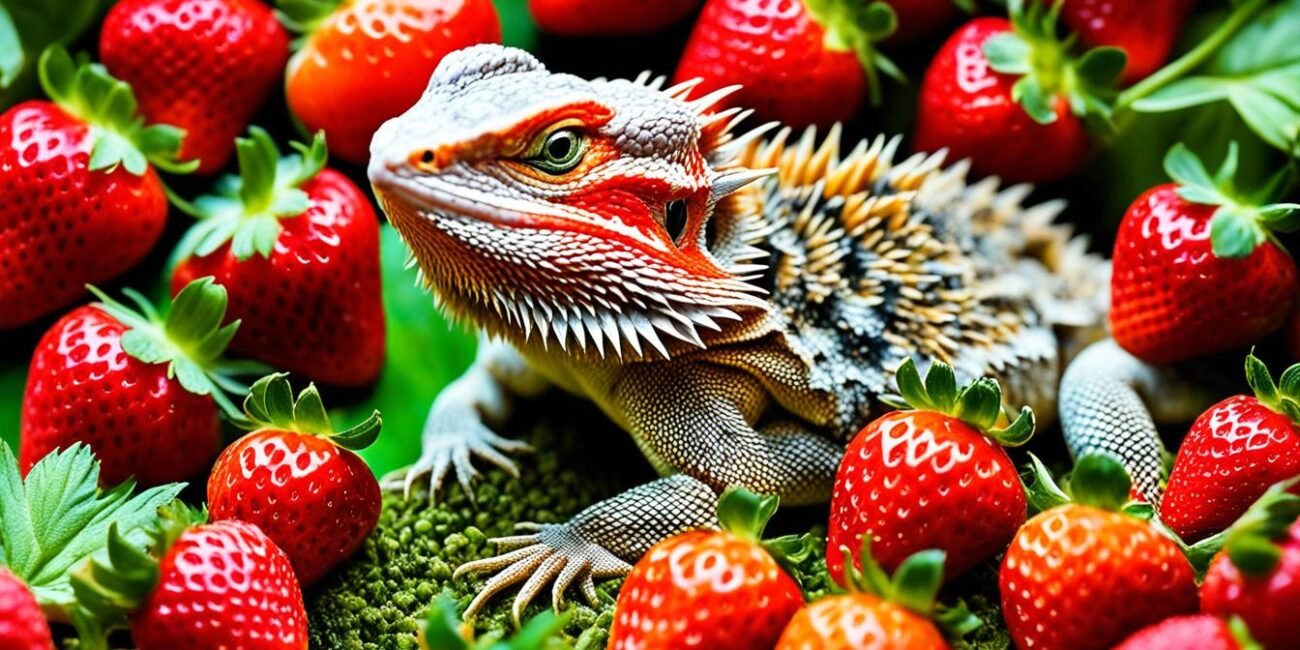
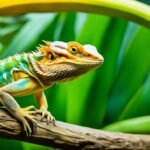
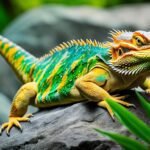


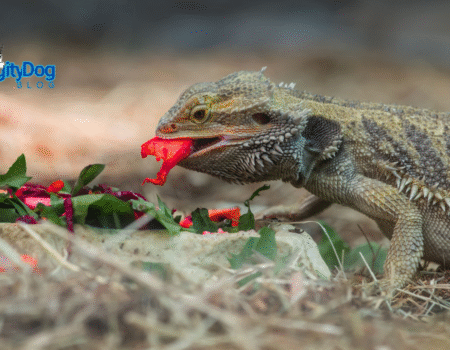
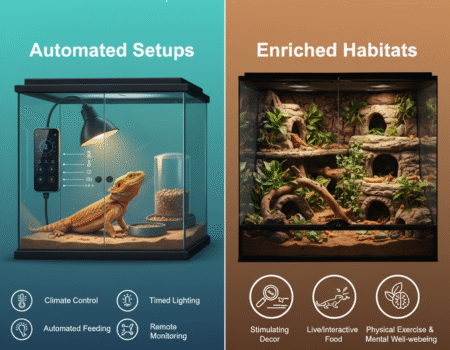
No Comment! Be the first one.